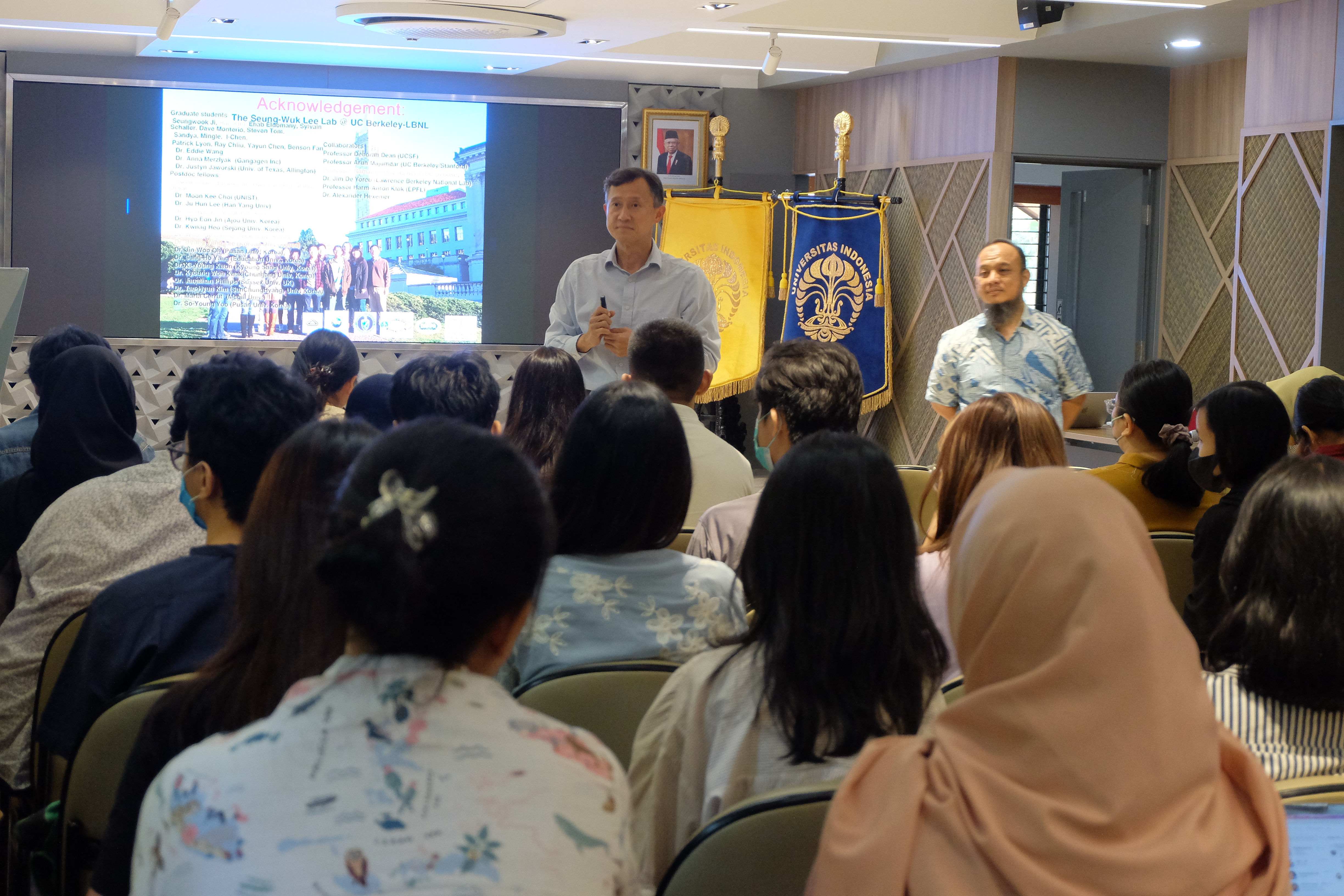Professor Lee Seung-Wuk, a nano expert from the University of California, Berkeley (UC Berkeley), gave a public lecture at the Faculty of Engineering, Universitas Indonesia (FTUI) entitled “Bioengineering Material Assembly and Application.” The public lectures were held in the Smart Meeting Room (SMR) Makara 04, 1st Floor Dean’s Building FTUI, on 10 October and 12 October 2023.
Professor Lee is a Professor of Bioengineering at UC Berkeley, USA, who has devoted himself to researching nanomaterials that can be used in various applications in biomedicine, biosensors, and bioenergy. Professor Lee’s research utilises an approach that combines chemistry and biology to create well-defined nanomaterials. The aim is to investigate complex phenomena and develop new biomimetic materials.
In his presentation, Professor Lee explained, “In nature, helical macromolecules such as collagen, chitin and cellulose have a very important role in the morphogenesis and function of various materials that have a hierarchical structure. When morphogenesis occurs, these chiral macromolecules are secreted and undergo template self-assembly. This is a process in which various kinetic factors affect the assembly of building blocks that form non-equilibrium structures.”
An individual macromolecule can form various functional structures when self-assembled under various conditions. For example, type I collagen forms transparent corneal tissue from orthogonally arranged nematic fibres, typical coloured skin tissue from cholesteric fibres, and mineralised tissue from hierarchically arranged fibres.
Professor Lee added, “Natural materials have a level of functional and structural complexity that exceeds the capabilities of current fabrication methods in both top-down and bottom-up approaches. However, the use of self-templating is still not fully explored in synthetic materials engineering. In my talk, I will show how we successfully created functional nanomaterials using chiral colloidal particles (phageM13) with a simple process. This one-step process produces supramolecular films with long-range sequences that exhibit different levels of hierarchical organisation and helical structures.”
Prof Lee further explained that through the process of self-assembly of template materials, we were able to create various supramolecular structures that are biomimetic. These materials have distinctive optical and photonic properties and can be used as chiral reflectors/filters and structural colour matrices. We will also discuss how the materials can be utilised as functional nanomaterials in the context of biomedical, biosensor and bioenergy applications.
The event was welcomed by the Dean of FTUI, Prof. Heri Hermansyah, S.T., M.Eng., IPU, from a separate occasion Prof. Heri said that “The topic raised by Professors from prestigious universities in the world is very interesting to study, that manufacturing assembly can be used for biomedical, biosensor, and bioenergy applications. This manufacturing assembly concept opens up very promising opportunities in the fields of biomedical applications, biosensors, and bioenergy. I hope that the knowledge shared by Professor Lee will inspire students and researchers at FTUI and can be applied in the learning and research process.”
Professor Lee Seung-Wuk obtained his B.S. and M.S. degrees from Korea University and his Ph.D. degree from the University of Texas. After completing a post-doctoral fellowship at Lawrence Berkeley National Lab, he joined the UC Berkeley faculty in 2006 and was later promoted to Associate Professor in 2011, with a full professorship in 2015. In addition, Professor Lee also serves as Associate Director of the Centre for Integrated Nanomechanical Systems at UC Berkeley and Scientist of the Physical Biosciences Division at Lawrence Berkeley National Lab.
Awards that Professor Lee has achieved include the R&D 100 Award in 2013 and 2015, as well as the NSF CAREER award. Dr Lee’s ongoing research has been selected as one of the 12 flagship studies selected by the National Science Foundation during President Obama’s administration for a report to the United States Congress entitled “Manufacturing Goes Viral” in 2014. In addition, his research was also selected as one of the five leading studies in the field of Future Nanomanufacturing by Scientific American in 2013.
***
Public Communication Bureau
Faculty of Engineering, Universitas Indonesia

